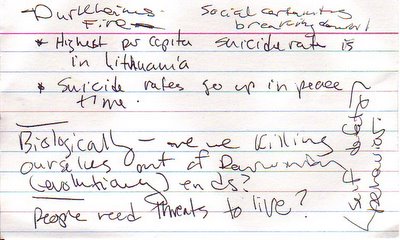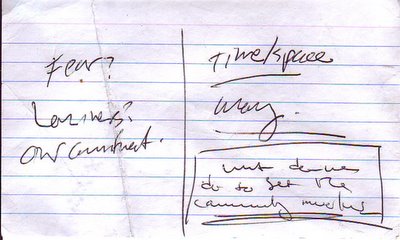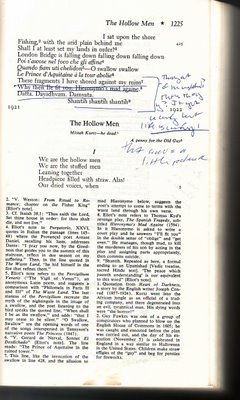I've come to the conclusion that I do not understand when I am under stress. Is everyone that way? Can we all not see the signs? I'm not talking a full-blown attack of stress caused by a stressful situation. I am talking about suble stress developed over time. I am thinking particulaly of stress that builds up because of situations in our lives such as relationships or the lack thereof or of the jobs we take (even though they might not be particularly stress on the face of it.)
Perhaps we can only perceive our stress state when others observe it for us initially. Maybe it is too easy to ignore subtle signs of stress build up. Ultimately it all leads to bad mental and physical health.
Issue 57: here's an equivocator that could swear in both the scales against either scale
Wednesday, November 30, 2005
Saturday, November 26, 2005
First snow
It is snowing today and I am laying in my bed watching it. The light is a subtle grey-brown. I like the meditative nature of snow fall. It makes one less compelled to do anything other than watch it swirl in patterns across the bare bones of the trees outside. But the juxtaposition is there, of course. I am warm and inside and protected from all this. I am enabled to appreciate the beauty of what for others at other times and in other circumstances must have seen/see as nothing but pain and suffering. Still, though, even the most life-battered twelth century Northern European peasant must have looked out of his hovel one fine November morning to see snow twisting down to Earth and felt something akin to the peace I feel now.
Thursday, November 24, 2005
Wednesday, November 23, 2005
Way of the Puck
Sleepy E. has the web site up for his movie Way of the Puck. A man of many talents, that Sleepy E.
Carter and Tif
Tif dropped by my office today with baby Carter. He was in some fancy Swedish carrier thingamabob. he slept slouched over most of the time, but woke up a few times during the visit. The baby, of course, attracted various folks to come into my office and enjoy his presence. Tif and I talked about the various realities of parenthood. In all she seems to be adjusting well, despite some rather major difficulties her family is facing. That's personal stuff that I am not going to go into here, so nertz to you kind reader.
Crime and punishment
The Christmas tree lot down the road has inspired another story of waywardness and intrigue. The plot is fairly simple: a twenty-something ne'er-do-well steals a Christmas tree at 3 in the morning from a fenced lot. The action is the actual theft which will be coincidental to the self-exploration/explication of the thief. The thief has a somewhat cliched life (and he knows it) of substance abuse, craptastic jobs, familial responsibilities (child), and debt--lots of debt. He, of course, is stealing the tree because he doesn't have the money to get one. He doesn't delve in justification, however, since he knows what he is doing and justification is just self-deception on his part.
I was boring Mid-B on the bus this morning with the overall plot design and the philosophical underpinnings of what I am aiming at. It is a sort of Les Miserables or Crime and Punishment gone terribly wrong, with a criminal who recognizes his crime, won't justify it, and does it anyway all for the silliness of an Xmas tree. Don't worry he is not going to get shot or anything. Who do you think I am, Flannery O'Connor?
Ultimately the guy has an "examined life" in a minor sense, but that's kind of a twist of the story that I don't want to over think, otherwise it will just become overwraught and dydactic. Necessarily the synopsis here really doesn't do my idea all that much justice, but hey, I don't want to give everything away to bloggity-town now do I?
I was boring Mid-B on the bus this morning with the overall plot design and the philosophical underpinnings of what I am aiming at. It is a sort of Les Miserables or Crime and Punishment gone terribly wrong, with a criminal who recognizes his crime, won't justify it, and does it anyway all for the silliness of an Xmas tree. Don't worry he is not going to get shot or anything. Who do you think I am, Flannery O'Connor?
Ultimately the guy has an "examined life" in a minor sense, but that's kind of a twist of the story that I don't want to over think, otherwise it will just become overwraught and dydactic. Necessarily the synopsis here really doesn't do my idea all that much justice, but hey, I don't want to give everything away to bloggity-town now do I?
Monday, November 21, 2005
watched pot never boils
I didn't really feel motivated to take any more pictures of Pittsburgh. Don't get me wrong, it is a fine city and all, but something about the cold just made me not want to take pictures--well that and my professional obligations.
Thursday, November 17, 2005
Steel Town
You know Pittsburgh was named for Pitt the Elder: the British Prime Minister who along with George III pretty much created the American Revolution. (Note I refuse to use the British received term for that war "The American War of Independence." It was a revolution in terms of who gets to be in charge of government. It just took a while for it to be spread out to the people.) I note that because Pittsburgh was the frontier back in the 1700's. I sense a bit of frontiership here still, along with a lot of East Coast issues that, no doubt, permeate the country.
Wednesday, November 16, 2005
On the road
Well the nice thing about not staying at a conventions main hotel is that you get things like free wireless access--well that and about 100 bucks savings in room rates. I am not really sure why they chose Pittsburgh in November to hold a convention. It is cold and windy here. The cab driver on the way in from the airport said, however, that it was in the 70s until just yesterday. It is supposed to snow tomorrow. The cab driver was quite chatty and called me "brother" frequently. He was interested in what all us teacher folk were doing in town and lamented his lack of writing abilities. I encouraged him to enroll in a class, and he said he'd think about it.
My hotel is near Pitt, but there is no one out on the streets because it is so cold and windy out, save a few college students getting groceries at the CVS pharmacy down the street.
Downtown is somewhere that-a-way and I'll go explroe it tomorrow and register for the convention.
My hotel is near Pitt, but there is no one out on the streets because it is so cold and windy out, save a few college students getting groceries at the CVS pharmacy down the street.
Downtown is somewhere that-a-way and I'll go explroe it tomorrow and register for the convention.
Tuesday, November 15, 2005
One for the road
Sunday, November 13, 2005
"To Margaret Fuller Drowned"
This text differs from the first edition in May 1969 and the second in July. About a hundred of the old poems have been changed, some noticeably. More than ninety new poems have been added. These have not been placed as a single section or epilogue. They were scattered where they caught, intended to fulflesh my poem, not sprawl into chronicle. I am loath to display a litter of variants, and hold up a still target for the critic who knows that most second thoughts, when visible, are worse thoughts. I am sorry to ask anyone to buy this poem twice. I couldn't stop writing, and have handled my published book as if it were a manuscript." (264)Lowell then goes on to list a sequence of dates stating that "Dates fade faster than we do....I list a few that figure either directly or obliquely in my text..." (265). The list includes the various wars, riots, protests, assassinations, uprisings, and the death of Che Guevara. The Vietnam War bookends this list, with a desperate -- coming at the end of the list of years: "1970, --" (265). It would be, of course 5 more yeas before the Vietnam War ended. Lowell himself only had seven more years before he died in the back seat of a New York cab of a heart attack.
I am interested in Lowell's work not so much because his poetry appeals to me (at times I think it belaboured and too dense to enjoy) because of the odd development of this text; how it is several texts, in fact, in one. What Lowell apologizes for is what makes it intriguing to me. I've been looking for various editions of it to get the full textual sense of it and how the events of the time seem to shape these poems. This is interesting to me because Lowell has been ascribed simply as a poet of the interior monologue (that is he writes simply about himself and his own story.) Lowell, obviously, did not see his poem Notebook that way. To him it seems to incorporate the period and seems to have some political/cultural import.
The various "sonnets" (the entire Notebook is broken into 14 line poems of mostly blank verse) all seem to need a key that Lowell doesn't necessarily supply, but they are also intriguingly compelling in their comment on American culture:
Earth of our pot I smashed dogs me four flights--In my notes on "Margaret Fuller Drowned" I note that I was particularly concerned with the number of times that Fuller's voice was mentioned. She offers a clarion call, as it were, but also seems to be screaming while being drowned. Fuller, of course, was from that idealist/transcendental school that saw man as part divine and certainly perfectable (thus all the utopian colonies of the time--see Blythesdale Romance or even a biography of Fuller herself). Lowell seems to be projecting Fuller and her transcendental idealism into the future, but also into a stark reality that was also there. Despite their best intentions and their highest expectations, transcendentalists were on the verge of watching American blow a part in bloody civil war.
you are your biographer's best American woman,
in a white nightgown, hair fallen long
at the foot of the foremast, Margaret Fuller
forty, Angelo thirty, Angelino one--
drowned with brief anguish, together, and your fire-call
Your voice was like thorns crackling under a ot
you knew the Church loads and infects as all dead forms,
however brave and lovely in their life;
progress is not by renunciation.
'Ourselves,' you wrote, 'are all we know of heaven.
With the intellect, I always can
and always shall make out, but that's not half--
the life, the life, O my God, will life never be sweet?'
(90)
Progess is not by renunciation? Progress is not by renunciation. Hmm. Perhaps that is the comment Lowell is making. The world is a knowable place and you can make sense of it.
Can you Margaret? Did you while you were drowning with your Angelo and Angelino? Is this the dirt from the pot that sticks to (dogs) the poets feet four flights?
I've had this idea of a story where the ghost of Robert Lowell haunts a perfectly unsuspecting person (one who has never heard of him) or something like that. It should be worth a laugh or two.
Dulce Et Decorum Est
Dulce Et Decorum Est:
"If in some smothering dreams you too could paceBBC has an interesting production about Owen and Sigfriend Sasson.
Behind the wagon that we flung him in,
And watch the white eyes writhing in his face,
His hanging face, like a devil's sick of sin;
If you could hear, at every jolt, the blood
Come gargling from the froth-corrupted lungs,
Obscene as cancer, bitter as the cud
Of vile, incurable sores on innocent tongues,--
My friend, you would not tell with such high zest
To children ardent for some desperate glory,
The old Lie: Dulce et decorum est
Pro patria mori."
Wilfred Owen
Friday, November 11, 2005
Thursday, November 10, 2005
In the land of lost notes the man with the note cards would be the tax accountant
Announcing the Land of lost notes.
Pretentious? Probably. Most likely. Go to hell.
Art? Well it is artifice. I call it text work. Text workers of the world unite!
Notes? Lost? But they aren't really note and they aren't lost now are they? Got to hell.
Pretentious? Probably. Most likely. Go to hell.
Art? Well it is artifice. I call it text work. Text workers of the world unite!
Notes? Lost? But they aren't really note and they aren't lost now are they? Got to hell.
Monday, November 07, 2005
Train story
I had some extra train time today so I started a story. Now I haven't seriously written a story in a while now, and when I do I am always surprised what comes out. I think I was challenged a bit by Mid-B this morning who scoffed at the notion of writing a novel (no offense you folks noveling over there at that one site). I too know I don't have anything close to a novel in me, but I think I do have the occasional weird story to wield.
With that said, my extra train time was useful as words literally spewed from my fingers. I think I amused lis (she laughed for whatever that means) when I read bits of the story to her while wating for a meeting to start:
I kind of hate the character and I kind of like him. I've got a lot more and sketched out the posibility of a plot. I will probably work on it some more, but I sense I am fast losing interest in Jimmy. I kind of just wish he would go away.
By the way, the first clip is actually from near the end of what I was writing. It was going nowhere and the character needed something to do but waffle around about his existence.
Update: Jimmy's got a full-blown action scene now. It involves a cop with a magnalight and some probable drunk driving. Poor Jimmy.
Update 2: Woot! it is only suspected drunk driving. Apparently he was attacked by a wasp. Poor Jimmy.
Update 3: Woot 2! I've actually eliminated some of the crap I posted above and have a half-way decent story now. Hmm. Poor Jimmy. He wants to cry in the story, but doesn't. Poor Jimmy.
Update 4: Pretty decent little tale. We'll see how I feel about it in the morning. Poor Jimmy.
With that said, my extra train time was useful as words literally spewed from my fingers. I think I amused lis (she laughed for whatever that means) when I read bits of the story to her while wating for a meeting to start:
and
So I know you're asking me, what's the point of all this Jimmy? What the hell are you getting at? Well I guess I am just trying to explain why the hell I'm sitting here at this bus stop out in the middle of the fuck end of nowhere with 20 bucks to my name and a fucking fat lip and two black eyes. I have this notebook and a pen and time to kill so it seems like I should just write it all down. They call that therapy right? Yeah right.
The only exceptions to people not really believing in rules are probably in relationships or something of equal meaning (is there such a thing?) You have to be believers in the rules when you are in a relationship, otherwise it is just sort of like continually faking orgasms (and yeah men can do it too, ladies; you just have to be convincing and put on a good show; although most of the time there's no reason to, but sometimes it just seems like the right thing to do).
The only exception to faking belief in the real categorical imperitive of the rules that I've found so far in my 10 real relationships (I don't count those that don't go past two contacts--sex involved or not) is Trish Hadavic and I'm not sure she really counts because I think she is a classic example of a sociopath. I mean nothing meant anything to her and lying was just par for the course. It was lie upon lie with her. It didn't even matter what it was about. It could be about who openned the peanut butter and she'd claim that I did it in my sleep. Don't get me wrong. I don't hate liars. Hell I'm spend most of my time telling lies to get out of things or to get into things. It is just that, I guess, I always felt Trish broke the only rules that most people really believe in. I should have known better to get involved with the ex girlfriend of a previous girlfriend but at the time it seemed like a good idea.
And that could be the motto or the mantra for my life, you see. Like spouting off the first thing that comes to mind, I usually let my life be lead by what seems to be a good idea at the time. Its stupid and I know I should stop doing it, but that never seems like a good idea when I'm faced with a decision to make. Give your best friend a thousand bucks because he's down on his luck and has to get a paternity test? Sounds good to me. Sure do it. Only later you find out that there was no way the kid could have been his anyway and he's never going to pay you back because he can't keep a job at being a fry cook.
I kind of hate the character and I kind of like him. I've got a lot more and sketched out the posibility of a plot. I will probably work on it some more, but I sense I am fast losing interest in Jimmy. I kind of just wish he would go away.
By the way, the first clip is actually from near the end of what I was writing. It was going nowhere and the character needed something to do but waffle around about his existence.
Update: Jimmy's got a full-blown action scene now. It involves a cop with a magnalight and some probable drunk driving. Poor Jimmy.
Update 2: Woot! it is only suspected drunk driving. Apparently he was attacked by a wasp. Poor Jimmy.
Update 3: Woot 2! I've actually eliminated some of the crap I posted above and have a half-way decent story now. Hmm. Poor Jimmy. He wants to cry in the story, but doesn't. Poor Jimmy.
Update 4: Pretty decent little tale. We'll see how I feel about it in the morning. Poor Jimmy.
Sunday, November 06, 2005
"Like hell you are"
Sometimes you read something and you just can't keep yourself from doing a spit take:
The house is filled with poets and short story writers. Jackets are piled on the bed in the bedroom and people are lying on them or on the floor telling stories about losing their virginity. Everybody has an MFA so every story has a small inappropriate observations. "He put his hand between my legs at the movie theater. I was wearing my mother's skirt." "I was fifteen, she was nineteen. It was the day after my best friend committed suicide." (Stephen Elliott, "My Little Brother Ruined My Life", Maisonneuve)
Saturday, November 05, 2005
For the list of good things to hear from the TV when turning it off since you are leaving for a night on the town and will not be watching the game
"Jazz up by ten."
Could it be? 2 and 0 with 2 games in the season! Playoffs here the fuck we come.
Yeah right.
Could it be? 2 and 0 with 2 games in the season! Playoffs here the fuck we come.
Yeah right.
Thursday, November 03, 2005
They condescend to fix upon me a frown
As I think I've mentioned before, I get obsessed with songs and sometimes albums and have the tendency to listen to them over and over (and over and over) and over and over and over. And over and over. If I didn't have headphones, you can only imagine how insane this would make anyone around me or how insane it would make me appear. It is lucky for me that our modern age has invented for me several pairs of headphones with which I can indulge in my analytic obsession. Analysis is generally what it boils down to. I hear something that is really appealing to me or baffles me (or whatever) and I generally want to understand why it is so appealing (aside from the initial aesthetic appeal of well-played, well-constructed music).
Lately I've been obsessing over The Decemberists' album Picaresque. I recall hearing it a while ago, but it didn't stick. Yet all of a sudden a few weeks ago Housemate Jeff brought it home and it hasn't left the CD player or my regular iTunes rotation the entire time.
"So then what is gives with this particular CD, Oh Orris?" I hear you ask, mighty reader. Well to be blunt, the album itself is perfectly baffling. While it has all the elements of Beck(Uncle Tupelo)-like alt (country) rock and a singer who has an engaging, energetic voice with lyrics balladically tell a story, they sing songs that seem entirely un-modern--indeed one might call them traditional British Folk songs (mostly). And why is a band that should be whipping out top 40 rock dealing with such folky themes in a quasi-folky way when they are obviously not at all folky? What is going on, Decemberists?
Well, gentle reader (don't worry, you're still mighty to--mighty and gentle), I'll tell you what is going on. The Decemberists are a fine of example of post modern artistry: they have assumed the very musical and lyrical tropes that make up folk or traditional music but have turned them ever so slightly around by throwing them in a very modern musical setting and given these simple melodramatic themes modern significance and modern appeal. No longer is the melodrama they exploit in a song like "We both go down together" sappy--it is now somehow intelligent and worth feeling skewered with postmodern sensibilities.
No longer is a simple stupid little high school football game nothing important to sing about ("Sporting Life"), but now it is the whole world (as it is, indeed for me when I was a kid). (Something about that song reminds me of Max Fischer from Rushmore). The Decemberists strangely get what it is to be human in our times and present it in their song--no matter how weirdly eclectic they seem. And they do all this by addressing the mundane melodramatic things that seem to concern us all: love, revenge, los--whatever.
"But hold on, dear Orris!" I hear you exclaim, "Those things are the regular subject of schlock modern culture." Indeed, dear and mighty and gentle reader. Indeed. (Read on, gently if you must, but I presume your mightiness, so be prepared to comment boldly.)
The Decemberists take cliche subjects and put some sort mondo, nova-folk minimalist post-rockalistic shape to them. (I won't even go into their moments when they make musical references to postmodern composers like Adams or Glass and make their minimalist repetition work quite well in the songs.) They do all this, indeed, never mocking the subjects that they have taken on. In fact I think that is what makes their songs so appealing. They've got an honest eclectic enough edge to them with some pretty decent musicianship that somehow they make sense. At the same time it is postmodernly relevant to all of us. Put it this way: it is like bowling. While at the same time one might be mocking the idea of bowling one is also enjoying bowling too. Damn I love being postmodern.
Take, for example, the song "We both go down together":
See this is where it is going: when is the historical setting for this son? Why the hell does it sound so familiar? Even in our times do ill-matched young lovers throw themselves off cliffs for love?
What I am getting at is that The Decemberists are successful simply because this weird little song and all the other weird little songs on the album work precisely because they understand that people still kill themselves out of love; people still have relationships their parents will never approve of; people still fail; people still have parents who have rotten relationships; people still want revenge. It is only our modern fakery that hides traditional cultural/personal behaviors.
All this comes to a head in the song "16 Military Wives" which is a dismantling of war and patriotism (think Charles Ives setting e.e. cummings to music) as well as the reaction to all of that by the received, so-called liberal community. This enthusiastic, upbeat tune has somehow caught everything in its net, and despite its seeming happiness, it is about the darkest song I've ever heard.
So, reader (still great, mighty, and dear), you might ask, am I talking about some sort of "universal themes" that the half-assed structuralist New Critics tried to throw at us as a theory for everything in literature? Hell no! What I am talking about is the conceit that modernity has freed us from our cultural histories and the behaviors that caused them; that somehow we are so radically different now that we share nothing with a simple little folktale or folk son--or, for that matter all literature from the past. The conceit is that like small pox, we've somehow been freed of all that. Bullshit.
What Picaresque gets at is our seeming inability to escape our pasts, despite all the work that writers have done particularly in the twentieth century. Young people still kill themselves out of love; the poor and the rich are still not allowed to mix; there is still racism and sexism; we still seek revenge; we still fight in wars that have purposefully unstable and oft-switched causes. All the while we write and sing about the injustices of life, and we sing on and on and on:
It all makes me want to work some more on Tales of a Basque Grandmother (and no, that is not all my work there gentile and mighty and dear and kind reader.) Kendra Koo?
Lately I've been obsessing over The Decemberists' album Picaresque. I recall hearing it a while ago, but it didn't stick. Yet all of a sudden a few weeks ago Housemate Jeff brought it home and it hasn't left the CD player or my regular iTunes rotation the entire time.
"So then what is gives with this particular CD, Oh Orris?" I hear you ask, mighty reader. Well to be blunt, the album itself is perfectly baffling. While it has all the elements of Beck(Uncle Tupelo)-like alt (country) rock and a singer who has an engaging, energetic voice with lyrics balladically tell a story, they sing songs that seem entirely un-modern--indeed one might call them traditional British Folk songs (mostly). And why is a band that should be whipping out top 40 rock dealing with such folky themes in a quasi-folky way when they are obviously not at all folky? What is going on, Decemberists?
Well, gentle reader (don't worry, you're still mighty to--mighty and gentle), I'll tell you what is going on. The Decemberists are a fine of example of post modern artistry: they have assumed the very musical and lyrical tropes that make up folk or traditional music but have turned them ever so slightly around by throwing them in a very modern musical setting and given these simple melodramatic themes modern significance and modern appeal. No longer is the melodrama they exploit in a song like "We both go down together" sappy--it is now somehow intelligent and worth feeling skewered with postmodern sensibilities.
No longer is a simple stupid little high school football game nothing important to sing about ("Sporting Life"), but now it is the whole world (as it is, indeed for me when I was a kid). (Something about that song reminds me of Max Fischer from Rushmore). The Decemberists strangely get what it is to be human in our times and present it in their song--no matter how weirdly eclectic they seem. And they do all this by addressing the mundane melodramatic things that seem to concern us all: love, revenge, los--whatever.
"But hold on, dear Orris!" I hear you exclaim, "Those things are the regular subject of schlock modern culture." Indeed, dear and mighty and gentle reader. Indeed. (Read on, gently if you must, but I presume your mightiness, so be prepared to comment boldly.)
The Decemberists take cliche subjects and put some sort mondo, nova-folk minimalist post-rockalistic shape to them. (I won't even go into their moments when they make musical references to postmodern composers like Adams or Glass and make their minimalist repetition work quite well in the songs.) They do all this, indeed, never mocking the subjects that they have taken on. In fact I think that is what makes their songs so appealing. They've got an honest eclectic enough edge to them with some pretty decent musicianship that somehow they make sense. At the same time it is postmodernly relevant to all of us. Put it this way: it is like bowling. While at the same time one might be mocking the idea of bowling one is also enjoying bowling too. Damn I love being postmodern.
Take, for example, the song "We both go down together":
We both go down togetherWhy this melodramatic folk song that really isn't a folk song? I mean yes, folk songs do have elements like the rich boy and the poor girl, and the language of the lyric is decidedly anachronistic (wanton, duty, vast veranda) and the chorus acts a simple apostrophe in the classic sense (an Ai! In Classical drama, for example or an "Oh!" of the folk song), but usually the such folk songs the poor girl ends up being victimized by the rich boy (by having his illegitimate child) and the language is tweaked enough to be modern to rub against its supposed historical setting (when is it supposed to be? 19th century? 2005?) and the plaintive "Oh my love!" is remarkably like any modern love song (think any plaintive love song). In folk music, it is usually only in the opposite sort of songs where poor boys run away with rich girls of position that they get to live happily ever after (since everyone knows that rich boys are stuck-up twats and poor boys are basically good, at heart if not just a bit rascally enough to make them appealing to said rich girls.) But this song has none of that implying that through falling off the cliffs of Dover the ill-matched pair will find flight. (And I'm not even going to comment on the off-putting rape reference in the song, but suffice it to say I think it throws the whole thing into the problematic postmodernism that I think the song and the entire album represents.)
Here on these cliffs of Dover
So high you can't see over
And while your head is spinning
Hold tight, it's just beginning
You come from parents wanton
A childhood rough and rotten
I come from wealth and beauty
Untouched by work or duty
And oh! My love! My love!
And oh! My love! My love!
We both go down together.
I found you a tattooed tramp
A dirty daughter from the labor camps
I laid you down in the grass of a clearing
You wept but your soul was willing
(chorus)
And my parents will never consent to this love
That I hold your hand
Meet me on my vast veranda
My sweet untouched Miranda
And while the seagulls are crying
We fall but our souls are flying
(chorus repeated twice)
See this is where it is going: when is the historical setting for this son? Why the hell does it sound so familiar? Even in our times do ill-matched young lovers throw themselves off cliffs for love?
What I am getting at is that The Decemberists are successful simply because this weird little song and all the other weird little songs on the album work precisely because they understand that people still kill themselves out of love; people still have relationships their parents will never approve of; people still fail; people still have parents who have rotten relationships; people still want revenge. It is only our modern fakery that hides traditional cultural/personal behaviors.
All this comes to a head in the song "16 Military Wives" which is a dismantling of war and patriotism (think Charles Ives setting e.e. cummings to music) as well as the reaction to all of that by the received, so-called liberal community. This enthusiastic, upbeat tune has somehow caught everything in its net, and despite its seeming happiness, it is about the darkest song I've ever heard.
So, reader (still great, mighty, and dear), you might ask, am I talking about some sort of "universal themes" that the half-assed structuralist New Critics tried to throw at us as a theory for everything in literature? Hell no! What I am talking about is the conceit that modernity has freed us from our cultural histories and the behaviors that caused them; that somehow we are so radically different now that we share nothing with a simple little folktale or folk son--or, for that matter all literature from the past. The conceit is that like small pox, we've somehow been freed of all that. Bullshit.
What Picaresque gets at is our seeming inability to escape our pasts, despite all the work that writers have done particularly in the twentieth century. Young people still kill themselves out of love; the poor and the rich are still not allowed to mix; there is still racism and sexism; we still seek revenge; we still fight in wars that have purposefully unstable and oft-switched causes. All the while we write and sing about the injustices of life, and we sing on and on and on:
And I am a writer, writer of fictionsMan these folks are smart.
I am the heart that you call home
And I've written pages upon pages
Trying to rid you from my bones
I am a writer. I am all that you have hoped (on)
And I've written pages upon pages
Trying to rid you from my bones
And if you don't love me let me go
And if you don't love me let me go
(The Engine Driver)
It all makes me want to work some more on Tales of a Basque Grandmother (and no, that is not all my work there gentile and mighty and dear and kind reader.) Kendra Koo?
Wednesday, November 02, 2005
Got a craptastic team? ELECTRIC RING IS THE ANSWER.
"The Jazz have spruced up their 15-year-old arena, spending $1.8 million on an electronic ring around the upper bowl that, Haslam said, 'restores the wow factor that we haven't had for a while.' " SL Trib
They could also install a fan-control Ostertag prod. Now that would be worth 90 bucks.
Craig "The Traffic Cop" Bolerjack
With radio, there is just too much talking because you have to describe what is going on, so you're restricted on how much analysis you can make. SL Trib
So that crap that Bill Walton spews is now called analysis?
Subscribe to:
Posts (Atom)






















